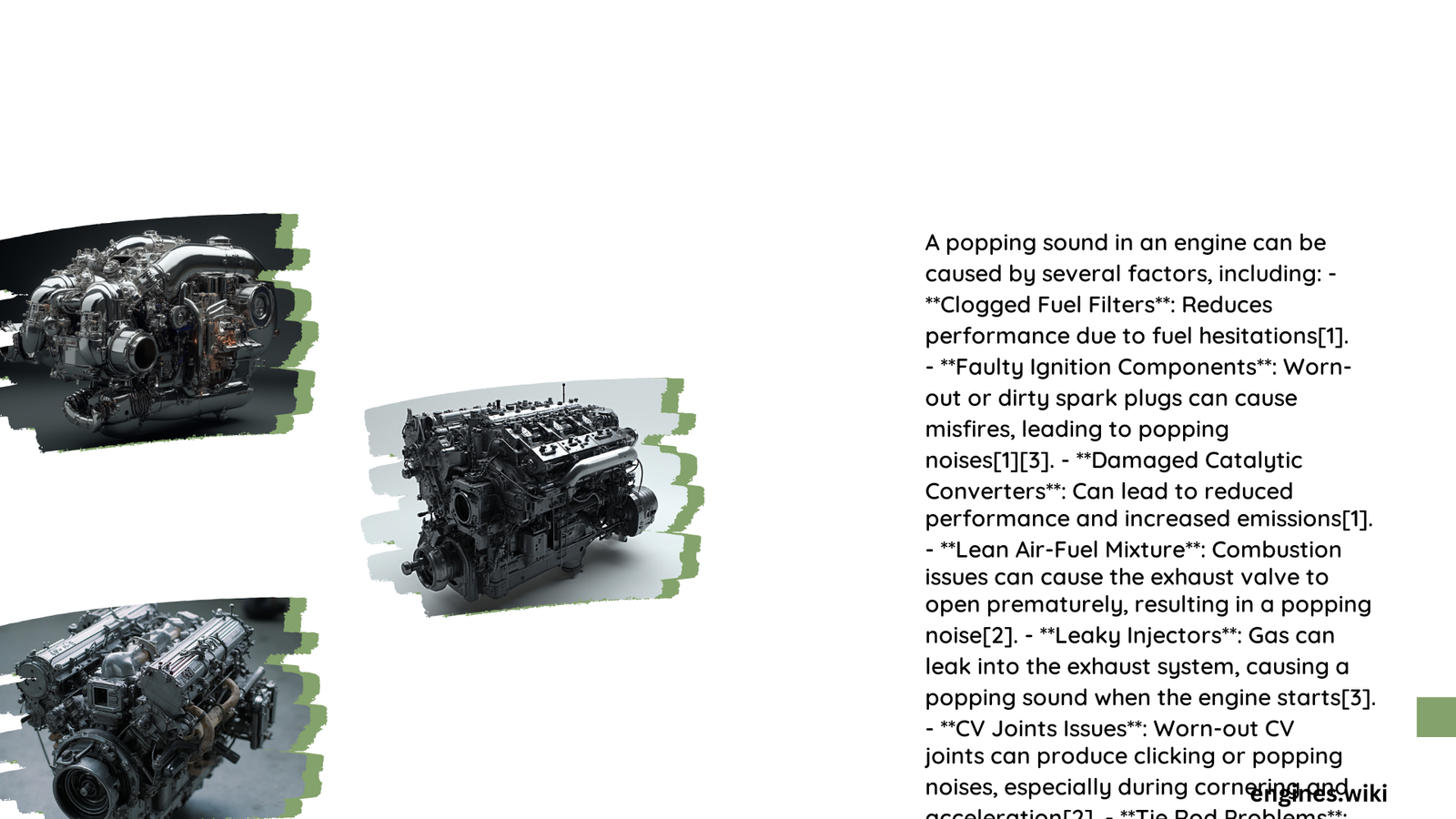A popping sound engine can be a concerning mechanical symptom that signals underlying issues with your vehicle’s complex combustion system. These unexpected noises often emerge from intricate interactions between fuel delivery, ignition timing, and exhaust system components, potentially indicating mechanical problems that require immediate professional attention or strategic diagnostic investigation.
What Triggers Popping Sounds in Vehicle Engines?
Fuel System Complications
Popping sounds frequently originate from fuel mixture imbalances. When an engine receives an incorrect air-to-fuel ratio, unburned fuel can escape into the exhaust system, creating distinctive popping or backfiring noises.
Key Fuel-Related Factors
- Malfunctioning oxygen sensors
- Clogged fuel injectors
- Incorrect fuel pressure
- Rich fuel mixture
Potential Mechanical Triggers
| Component | Potential Popping Cause | Diagnostic Complexity |
|---|---|---|
| Exhaust System | Leaks and pressure variations | Medium |
| Ignition System | Misfiring spark plugs | High |
| Timing Mechanism | Incorrect combustion sequence | High |
| Air Intake | Restricted airflow | Low |
How Can You Diagnose Popping Sound Origins?

Professional Diagnostic Steps
- Code Reading
- Use OBD-II scanner
- Identify specific error codes
-
Pinpoint potential system failures
-
Visual Inspection
- Check exhaust system for visible damage
- Examine spark plug condition
- Inspect timing belt/chain alignment
Advanced Troubleshooting Techniques
Experienced mechanics recommend comprehensive testing procedures:
- Compression test
- Fuel pressure evaluation
- Ignition system voltage check
- Exhaust backpressure measurement
What Are Potential Repair Costs?
Repair expenses vary significantly based on the underlying issue:
- Minor repairs (spark plugs): $50-$250
- Moderate repairs (fuel injectors): $300-$800
- Complex repairs (exhaust system): $500-$2,000
Performance Impact Considerations
Persistent popping sounds can indicate:
– Reduced engine efficiency
– Potential horsepower loss
– Increased fuel consumption
– Risk of long-term mechanical damage
Prevention and Maintenance Strategies
Proactive Maintenance Recommendations
- Regular scheduled service
- Timely spark plug replacement
- Consistent fuel system cleaning
- Annual exhaust system inspection
Warning Signs Requiring Immediate Attention
🚨 Critical indicators include:
– Consistent popping during acceleration
– Check engine light activation
– Noticeable performance degradation
– Unusual exhaust smoke
Expert Recommendations
Professional mechanics emphasize that while some popping sounds might seem minor, they often represent complex mechanical communications requiring skilled interpretation.
When to Seek Professional Help
- Persistent popping sounds
- Accompanying performance issues
- Unexplained engine behavior
- Complex diagnostic requirements
Technical Insights
Modern vehicle engines represent intricate systems where seemingly minor disruptions can signal significant mechanical challenges. Understanding these nuanced symptoms requires both technical knowledge and systematic diagnostic approach.
Reference:
– SAE Technical Paper on Engine Diagnostics
– ASE Automotive Repair Guidelines
– Professional Mechanic’s Diagnostic Manual
